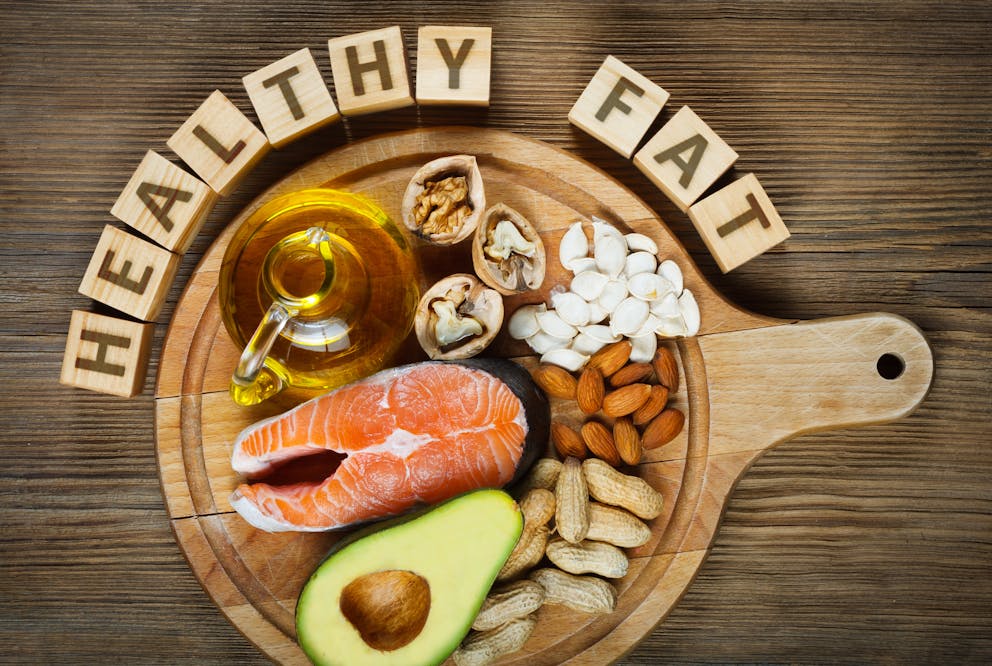Prevent Adrenal Fatigue on Keto with this
Many people believe that to lose weight, they must give up all their favorite foods. But, this is simply not true. There are plenty of delicious and satisfying foods that don't spike insulin and can help you reach your weight loss goals while supporting healthy blood sugar.
Insulin is a hormone that your pancreas produces to help your body use glucose for energy. When you eat carbohydrates, they're broken down into glucose, which enters your bloodstream. This signals your pancreas to release insulin.
However, when you constantly consume foods high in carbohydrates, particularly refined carbs and sugars, your body may become less sensitive to insulin, leading to insulin resistance.
As a result, your pancreas has to pump out more and more insulin to lower your blood sugar levels. Over time, consistently high insulin levels can prevent your body from burning fat for fuel and may even contribute to weight gain.
This is where choosing foods that don't spike insulin becomes crucial.
Understanding Foods That Don't Spike Insulin
Foods that don't spike insulin have a low glycemic index (GI) score. This means they are digested and absorbed more slowly, leading to a gradual and steady rise in blood sugar levels, rather than a sharp blood sugar spike.
A low-GI diet, rich in foods that don't spike insulin, not only supports sustainable weight management but also offers numerous health advantages. A low-glycemic diet can also have a positive impact blood sugar, further emphasizing the benefits of incorporating these foods into your diet.
By incorporating these foods into your daily meals, you can enjoy delicious and nutritious meals while effectively managing your weight.
Protein Powerhouses
When discussing foods that don't spike insulin, protein sources top the list. Not only are they incredibly satisfying, but they also have a minimal impact on your blood sugar levels, making them a good choice for blood sugar control.
Let's explore some protein-packed options:
Eggs: A breakfast staple, eggs are a nutritional powerhouse and incredibly versatile.
Meat (Beef, Lamb, Chicken, Pork): These are excellent sources of protein and essential nutrients, making them a great addition to your meals.
Seafood: Indulge in salmon, tuna, shrimp, or any other seafood that catches your fancy. Seafood is an excellent addition to a low-glycemic diet. Seafood is not only delicious but also provides healthy fats like omega-3 fatty acids, which have been linked to various health benefits.
While these proteins are great for managing your insulin levels, make sure you source them properly. Opt for grass-fed beef, pasture-raised poultry, and wild-caught seafood for optimal nutritional value.
Always check the labels on processed meats like sausages and deli meats, as they might contain hidden sugars.

Healthy Fats for the Win
Contrary to popular belief, fats are not the enemy. In fact, incorporating healthy fats into your diet can help curb cravings, stabilize blood sugar levels, and even promote weight loss.
When selecting fats, always prioritize sources of unsaturated fats like:
Avocados: These creamy green fruits are an excellent source of monounsaturated fats, fiber, and various vitamins and minerals. They are also known to have a positive impact on insulin sensitivity.
Nuts and Seeds: Munch on a handful of almonds, walnuts, chia seeds, or flax seeds for a healthy dose of fats, fiber, and protein. These nuts and seeds have a minimal impact on blood sugar responses and can be a valuable part of a blood sugar regulation strategy.
Olive Oil: A staple in the Mediterranean diet, olive oil is rich in heart-healthy monounsaturated fats and antioxidants. Olive oil has been shown to improve blood sugar control and reduce the risk of developing type 2 diabetes.
Coconut Oil: Coconut oil has gained popularity for its unique combination of fatty acids. However, remember that coconut oil is high in saturated fats and it's important to consume in moderation. Coconut oil's impact on blood sugar is complex and may vary depending on individual factors.
Veggies to the Rescue
No list of foods that don't spike insulin would be complete without non-starchy vegetables. These nutritional powerhouses are packed with fiber, vitamins, minerals, and antioxidants, all while being low in calories and carbs.
You have plenty of options, some great choices include:
Leafy Greens: Fill your plate with spinach, kale, lettuce, and arugula. Leafy greens are a true superfood when it comes to blood sugar management. They add volume to meals, keeping you fuller for longer, without spiking insulin.
Cruciferous Veggies: Broccoli, cauliflower, Brussels sprouts, and cabbage all fall under this category and contain compounds that support your overall health. They are low in calories and carbohydrates and have minimal impact on blood sugar levels.
Other Non-Starchy Choices:Mushrooms, asparagus, green beans, cucumbers, and zucchini are all excellent choices. Experiment with various cooking methods to make your meals more appealing and interesting.
Foods That Don't Spike Insulin: Exploring Further Options
While we've covered protein, healthy fats, and non-starchy vegetables, let's delve into some additional foods that have minimal impact on your blood sugar. These options provide further variety and can be incorporated into a proper diet:
Low-Glycemic Fruits
While many fruits are relatively high in sugar, certain low-glycemic fruits can be enjoyed in moderation as part of a proper diet:
Berries: Strawberries, blueberries, raspberries, and blackberries are all relatively low in sugar and high in fiber and antioxidants. The fiber content in berries helps slow down sugar absorption, leading to a more gradual rise in blood sugar levels.
Avocado: As mentioned earlier, avocado is technically a fruit and an excellent low-glycemic option.
Tomatoes: Often used in savory dishes, tomatoes are surprisingly low in sugar and rich in lycopene, a powerful antioxidant.
Legumes and Lentils
Despite being a good source of carbohydrates, legumes and lentils are generally low-glycemic foods due to their high fiber and protein content. The fiber and protein in legumes help regulate blood sugar responses, making them a valuable addition to a proper diet.
Here are a few examples:
Chickpeas: These versatile legumes are a staple in Mediterranean and Middle Eastern cuisine.
Lentils: A good source of plant-based protein and fiber, lentils are quick and easy to cook. Lentils rank relatively low on the glycemic index, making them a suitable option for those looking to manage blood sugar levels effectively.
Black Beans: A staple in Latin American cuisine, black beans offer a hearty dose of fiber and protein.
Understanding the Glycemic Load
While the glycemic index (GI) provides valuable insights into how quickly a food can raise blood sugar, it's also essential to consider the glycemic load (GL) of foods. The glycemic load takes into account both the GI of a food and the amount of carbohydrates it contains.
For instance, watermelon has a high GI, but a low GL because it contains a relatively small amount of carbohydrates per serving. This means that a typical serving of watermelon is unlikely to cause a significant spike in blood sugar.
To calculate the GL of a food, you multiply its GI by the number of grams of carbohydrates per serving and divide the result by 100.
Foods with a low GL (10 or less) have a minimal impact on blood sugar, while foods with a high GL (20 or more) can cause significant spikes. It's generally recommended to choose foods with a low to moderate GL for better blood sugar control.
Additional Tips for Managing Insulin Levels
Beyond choosing foods that don't spike insulin, several other lifestyle factors can significantly impact insulin sensitivity and overall health:
Regular Exercise: Engaging in regular physical activity can improve insulin sensitivity and help your cells utilize glucose more effectively. Aim for at least 150 minutes of moderate-intensity exercise or 75 minutes of vigorous-intensity exercise per week.
Adequate Sleep: When you don't get enough sleep, your body produces more of the stress hormone cortisol, which can increase insulin resistance.
Stress Management: Chronic stress can also disrupt hormonal balance and contribute to insulin resistance.

Top Insulin-Friendly Foods for Better Health and Beating Keto Flu
Choosing foods that don’t spike insulin is essential for maintaining better health, particularly for those managing diabetes or pursuing weight loss.
Foods with a low glycemic index, such as leafy greens, nuts, seeds, and fatty fish, help keep blood sugar levels stable and prevent insulin surges.
These insulin-friendly options are also crucial for those on a ketogenic diet, as they support ketosis and reduce the risk of experiencing "keto flu"—a set of symptoms including fatigue, headache, and irritability that can occur when transitioning to a low-carb diet.
By focusing on these nutrient-dense, low-carb foods, you can promote steady energy levels, enhance overall health, and ease the adaptation to a keto lifestyle, making the journey smoother and more sustainable.
Conclusion
Focusing on foods that don't spike insulin is not just a diet fad. It's a powerful approach to improving your health, managing your weight, and feeling your best.
Remember, creating a well-balanced plate with a combination of protein, healthy fats, and non-starchy vegetables is key to keeping those insulin spikes at bay.
Greek yogurt can be a valuable addition to your diet for managing insulin levels. It is an excellent source of protein and low in carbohydrates, especially when you choose the unsweetened variety.
You can further enhance its nutritional value by adding fresh fruit, nuts, or seeds. As always, if you have underlying health conditions or are considering making significant dietary changes, it is essential to seek guidance from a healthcare professional.
Tags

Popular
08/21/2024
55.8K views
02/23/2025
46.9K views
11/18/2024
281.8K views
03/18/2024
11/21/2022




